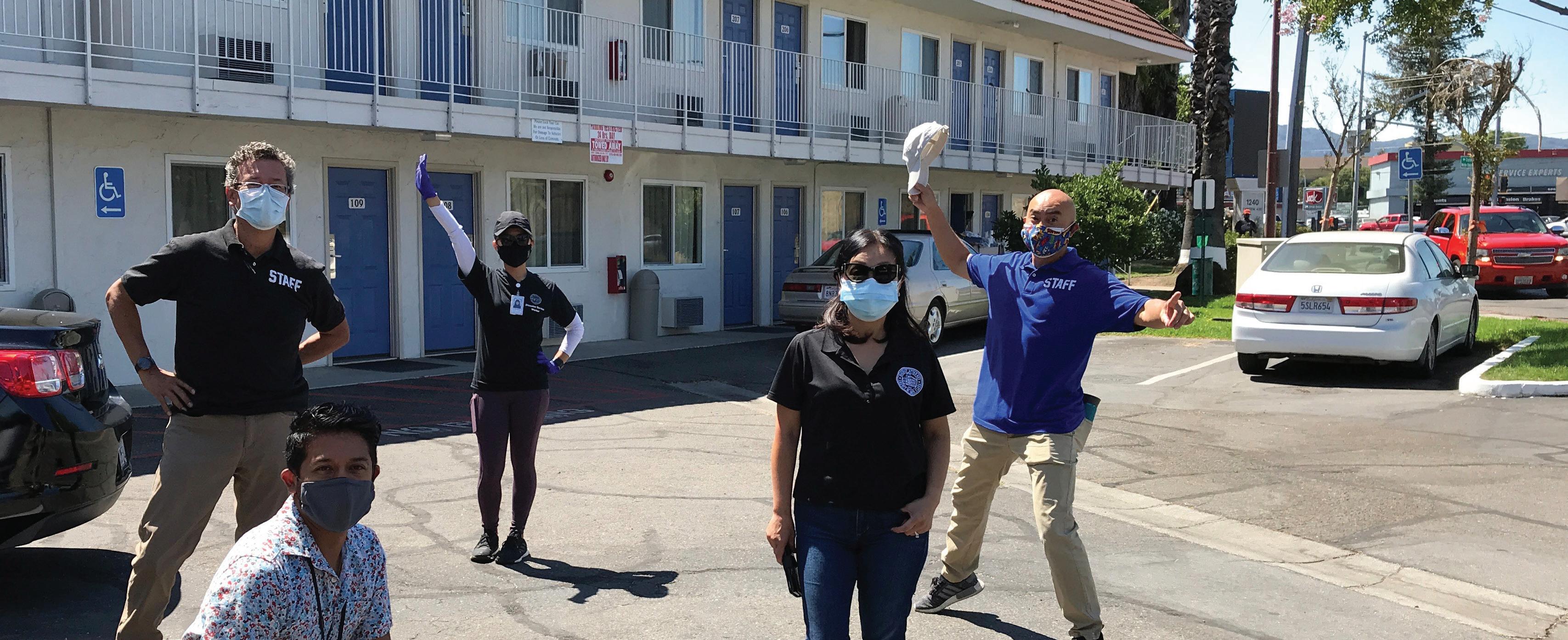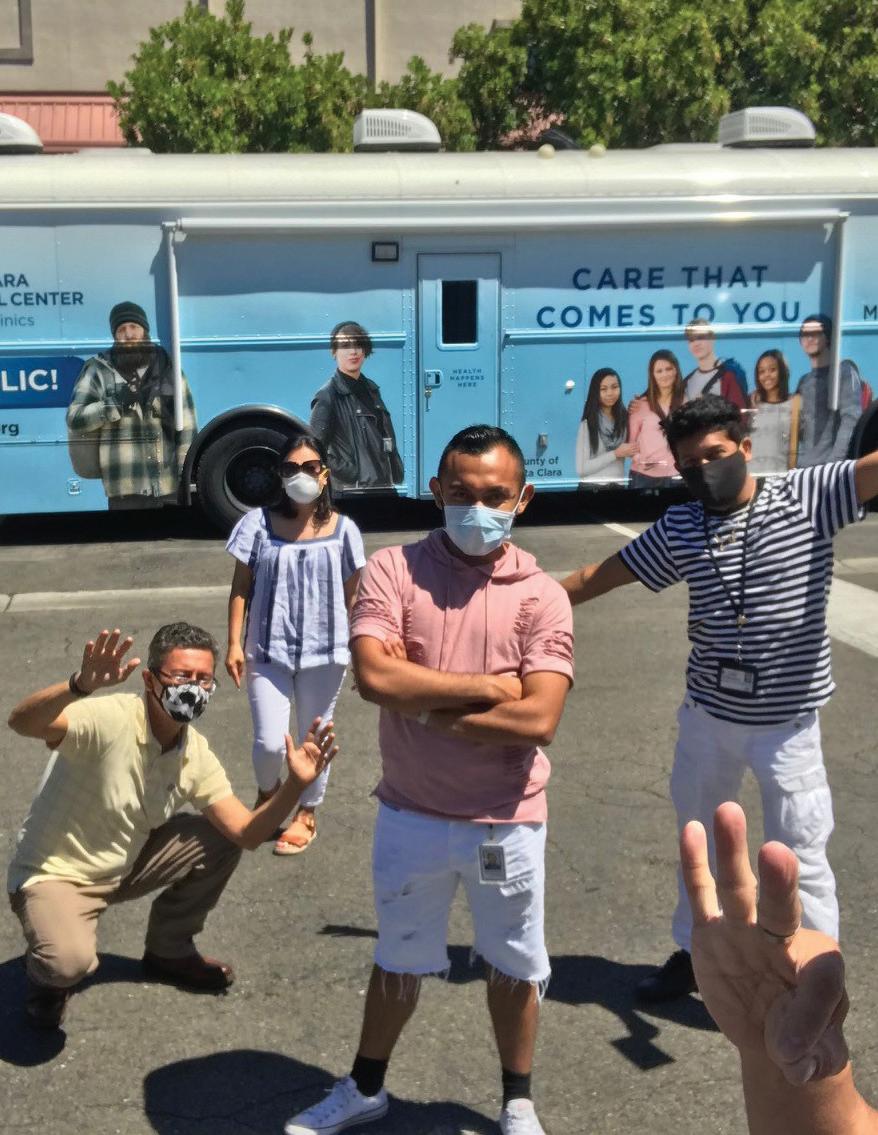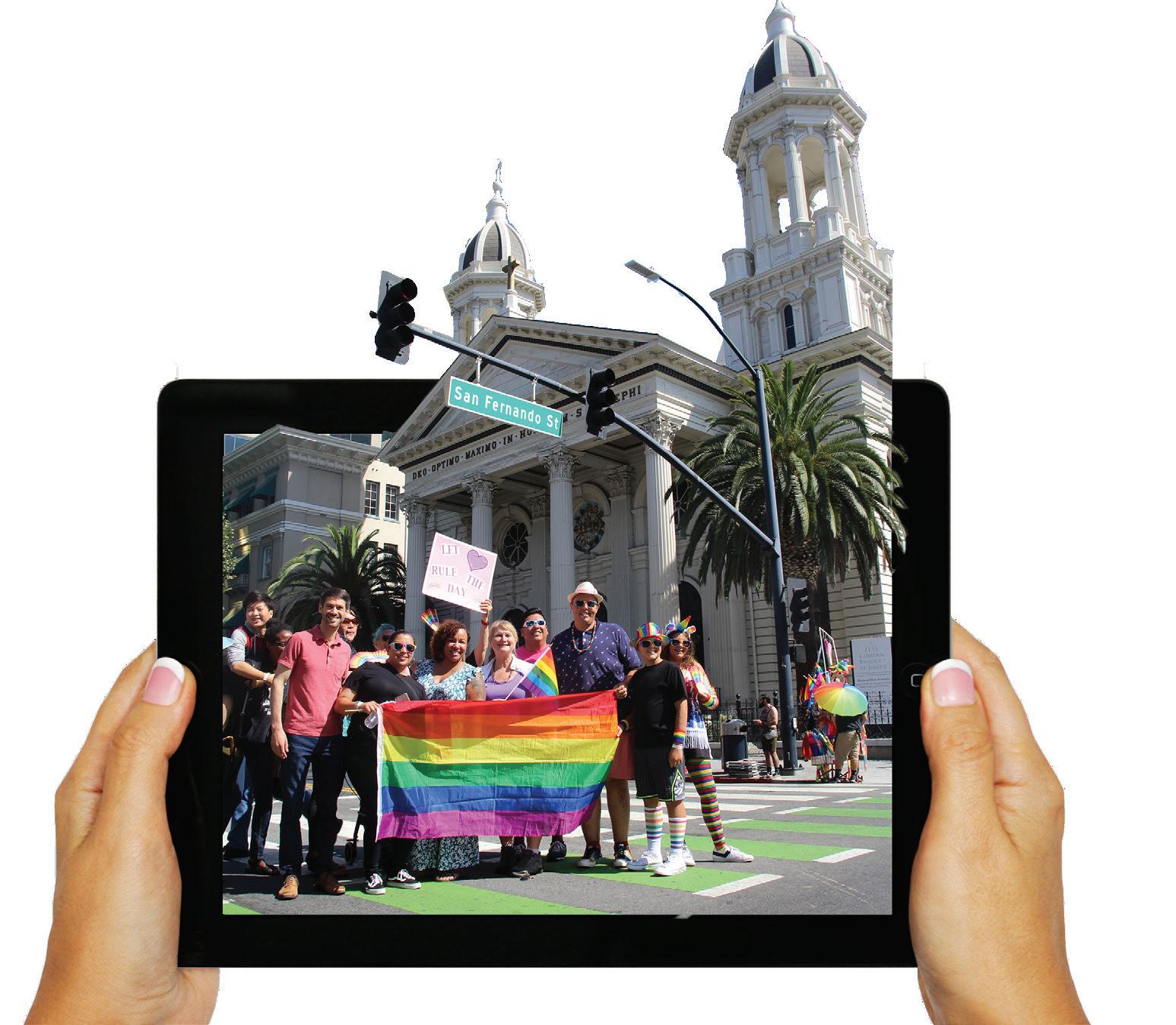
16 minute read
Flu shot
Dealing with COVID-19
Over the past few months, we’ve watched the Coronavirus (COVID-19) affect every part of our lives. But it doesn’t have to control our lives at home! Making some minor changes and creating new healthy habits can help you enjoy yourself and stay safe. Simply washing your hands, covering your cough, staying home when you don’t feel well, and wearing a mask while in public (or are around people you do not live with) will all help decrease the chances of catching and/or spreading the Coronavirus.
We understand, firsthand, how difficult it can be having to stay home. Being away from your friends and family is not easy. Not being able to keep your normal routine can be stressful, and can cause anxiety or depression. We have some tips that can help with your physical, emotional, and mental health, plus help you keep in contact with the people you care about most.
By making these healthy habits a part of your day, every day, you’ll be helping yourself and your loved ones.
2.
Good handwashing
Wash your hands for at least 20 seconds. Sing songs like “Happy Birthday” or “Twinkle, Twinkle, Little Star” to help you wash for the right amount of time. This is also a fun way to help your children remember how long to wash their hands.
3.
Limit trips outside
We know that staying indoors for long periods of time can be frustrating. But it is important to stay at least 6 feet away from people that you don’t live with so you can lessen the spread of COVID-19. The easiest way to keep a safe distance from other people is to stay inside.
Wear a mask
Wearing a mask limits the spread of droplets (which carry the virus) and protects others. It may decrease your chances of getting sick. If everyone wears a mask, you’ll be better protected. Oh, and it is important to wear the right type of mask. Read our story about picking the best mask on page 11.
4.
Try not to touch your face!
Especially where droplets and the virus can spread. It is harder for germs on your hands to enter your body if you don’t touch your face, mouth, or nose.
5.
Clean the areas you use the most regularly
By wiping down shared spaces with soap and water, cleaning products with bleach or ethanol alcohol, hand sanitizer, or disinfectant wipes you can kill COVID-19 germs on surfaces.
6.
Flu shot
When available, please make sure to get your annual flu shot.
Emotional and Mental Well-being
1. Write in a journal:
Writing is an amazing way to free your mind. Putting your thoughts down on paper can be very calming, relaxing, and therapeutic.
Keep your Social Connections. It is especially important during these difficult times.
Call loved ones
Join virtual hangouts Catch up with friends on social media Host game nights with your family Cook new recipes Start an e-book club
2. Take time for
yourself: While staying home is a great way to catch up on your favorite television shows; it isn’t always the best way to get alone time. Quality time with your partner and/or kids is great, but make sure to take time for yourself! Going on a walk or drive alone, sitting in your back yard alone to stretch, read, or listen to music are great ways to practice self-care.
3. Get some exercise:
Physical activity helps maintain a healthy lifestyle and can improve your mood. Just remember to stay at least 6 feet away from people if you exercise outside.
4. Eat: Healthy foods are best; choose fruits and vegetables, lean protein, and grains like oats.
5. Don’t take drugs and limit alcohol use.
6. Meditation/deep
breathing: See our mental health article on page 10.
When in Doubt!
Staying connected as well as practicing healthy physical, emotional, and mental health habits can help ease your mind. When possible, spend extra time with loved ones, even if it is over the phone. Remember to be kind to your body and stay in touch with what you are thinking and how you are feeling. Many of us are experiencing strong emotions because of COVID-19, but together we will get through this! Finally, if you are feeling overwhelmed, we can help. Talk to a doctor or a nurse through MDLive https://members.mdlive.com/vhp or your plan’s 24/7 Nurse Advice Line.
Handling Stress While Dealing with the Coronavirus (COVID-19)
A conversation with Dr. Rachel Talamantez
There are moments in life where we find ourselves feeling overwhelmed. When we are stressed or anxious, it can feel like you are carrying the weight of the world. It is important to understand the extent of how stress can affect our bodies and how we can learn to manage it.
We sat down with Dr. Rachel Talamantez from the County of Santa Clara Behavioral Health Services Department (BHSD) to help you better understand stress, including how it may increase due to the Novel Coronavirus (COVID-19) pandemic. We will also give you some tips to help you control it.
For starters, Dr. Talamantez shared that there are three categories of stress: mild, moderate, and severe. Mild stress is what we go through daily, like getting ready for work or caring for children. Moderate stress can feel overwhelming, but we are still able to cope and function. Then there is severe stress that can be a type of toxic stress. This can last longer than our usual stress and can be unpredictable.
How is stress changed by COVID-19?
Dr. Talamantez reminded us that people will have different responses to what happens around them.
Some people may be directly or indirectly affected by COVID-19. Some people may experience extreme stress while others will have mild interruptions to their daily routine. When you know how stress may increase due to the Novel Coronavirus (COVID-19) pandemic, you have a better chance of controlling it. It depends on what your body and mind sense about everything happening around you. Staying connected to family, friends, and social networks will help. Speaking up about your emotions is important. Make phone calls, do video chats, and find other ways to communicate with those who are important to you. Focus and take charge of what you can control. Put on a mask, wash your hands, and maintain healthy habits.
Dealing with your feelings
As many of us know, some people may feel sadness because they must shelter in place at home. People have missed out on events such as graduations and weddings. Travel plans have been interrupted and we are unable to socialize how we would choose. It is okay to feel disappointed. This allows you to focus on the things you can be grateful for and positive about. It is also important to remember that there are socio-economic factors that have affected many people that may cause more concerns.
Parenting and caregiving
Dr. Talamantez spoke about the fact that children react more with their behaviors than their words. As parents and caregivers, it’s important to have a network that supports you in this time. Your mental health can help or hinder those around you. Take notice of how your children are reacting to COVID-19 fears. Exercise together, eat healthy foods and set a routine. Allow them to ask questions and share their feelings, and don’t disregard their views. This will give them confidence to express emotions in a healthy way.
Be proactive
Another way to reduce stress and frustration is to create an emergency plan. This discussion will prepare your family for various situations. Develop a routine that helps you maintain stable emotional health and lower stress. Go out for a walk, get some sunshine, take a bath, or read a book that you enjoy. If you need help, please review county resources related to food, shelter, and financial support, as well as physical and mental health. Together, we will get through this.

MDLIVE Telehealth

Here at VHP, your health and wellness is our highest priority. As we work together to fight the Coronavirus (COVID-19), it is even more important that you can see the doctor in a safe, remote way.
Did you know that with VHP, you have a telehealth benefit that only costs your regular co-pay for a doctor visit? It is called MDLIVE! With it, you don’t need to leave your house to see a doctor. One of our MDLIVE doctors can meet with you on your phone or computer. Doctors are available 24/7, so you can get the care you need, anytime, from the comfort and safety of your home. It even covers Behavioral Health.
MDLIVE doctors can provide new prescriptions and up to 90-day refills if needed. The telehealth benefit is available to your whole family. Pediatricians and family practice physicians are available for your kids. And, MDLIVE doctors can treat many common conditions, so you can feel better faster.
Are fears about COVID-19 causing you stress or anxiety? MDLIVE can help there as well. If you or an eligible dependent are feeling anxious or overwhelmed, we encourage you to seek care. You can schedule an appointment seven days a week for help with anxiety, depression, or trouble dealing with life changes.
It is easy to access your MDLIVE telehealth benefit. To register, visit www.mdlive.com/vhp or call 1.888.467.4614 to set up your account. It only takes a few minutes and then you’ll be ready to get the care you need, when you need it. Now is the perfect time to try MDLIVE telehealth, another great benefit from your friends at VHP. You can also use our Nurse Advice Line if you aren’t feeling well. Call to speak with an experienced nurse who can answer urgent and non-urgent questions, assess symptoms, and provide care recommendations.
Employer Group members should call: 1.866.682.9492 (toll-free) Covered California and Individual & Family Plan members should call: 1.855.348.9119 (toll-free)
Beary Says, “Wear a Mask and Make Sure it is the Right Mask!”




Normally, during these warm summer months, you might see VHP’s mascot, Beary, all over town. But, like you, Beary is helping prevent the spread of the Coronavirus (COVID-19) by staying home, practicing social distancing while in public, and this fall, when it is available, getting a flu shot. Being a responsible friend, Beary is sure to always wear a mask in public, especially when not around family or roommates, and by keeping at least 6 feet away from other people.
Wearing the Right Mask The Wrong Mask
Beary has been talking with some doctor friends and people Not all masks protect you and others from Coronavirus at the County of Santa Clara Public Health Department (COVID-19). Avoid masks that have vents that let germs (SCCPHD) and learned something very important. Not all through when you breathe. The picture shows you what masks are equally effective in preventing the spread of kinds of masks you should NOT wear Coronavirus. It is important to make sure you wear the right kind of mask. The right mask will keep you and those around Beary wants to see you soon. So remember you safe and lower the chance of getting sick. to wear your mask and follow the other safety recommendations. We are all in this together, so please The Best Mask do what you can to make sure you and your neighbors The best mask is the one that you will wear, so look for one stay safe. that is comfortable. It should not have a hole or valve for breathing or eating. The mask needs to cover both your nose and mouth and stay in place comfortably. If you buy a mask from a store or online make sure it looks like one of these masks.


VHP Employees are Stepping Up to Help Our Community!
When you became a VHP member, you already knew that you were getting a quality health insurance plan. But you might not have known about what makes us different for the other plans you could have chosen. VHP is the only local commercial health plan. That means VHP employees live where you live. When our neighbors are in need, they are going to step up to help.
All VHP employees can be called to serve as Disaster Service Workers (DSW). During a natural disaster or public health emergency, DSWs get activated. When the Coronavirus (COVID-19) hit, many of your friends at VHP became DSWs. For several months, they haven’t been working their normal jobs. Instead, they wake up in the morning, grab their masks, and head out to help at-risk people.
Several VHP employees have joined teams to house the homeless. Many homeless people, especially the elderly or families with children, find it hard to shelter-in-place or social distance.
Several area hotels and motels are now temporary living spaces for the homeless. VHP staff working there make sure people are being fed, and have clean clothes and supplies. When new guests arrive, a VHP employee or other DSW welcomes them. They get a bottle of hand sanitizer, masks and gloves. A DSW takes their temperature and helps them fill out their paperwork. They also make sure that everyone understands the importance of proper social distancing. In the first week of operation, one location helped 18 people find shelter. Most guests were 60 years or older and came with walkers or wheelchairs. A young family was also provided a room. Many more people would join them in the following weeks. Now, they have a better chance of not catching the Coronavirus or spreading it to others.
The VHP employees give their co-workers regular reports on how things are going. They say their guests are very appreciative. All individual guests or families get a room of their own, eat three meals a day, and get fresh drinking water. But some guests don’t own anything except the clothes they were wearing when they arrived. Many DSWs have spent their own money to help the guests. They have donated clothes, toothpaste, care packages, and even games and puzzles. They are proud to serve at-risk people, but it is hard to see their neighbors struggle. Some of the guests are unable to cook or even heat up food. Luckily, the DSWs are always willing to lend a helping hand.
Many of the other VHP employees have pitched in to help. Through fund drives, we’ve purchased piles of personal items and clothes for donation.
We know the Coronavirus (COVID-19) has hurt our community in many ways. By working together, being patient with our neighbors and looking for ways to show kindness, we make things a little better for everyone.
VHP is proud of our co-workers serving on the front lines during this crisis. And we’d like to thank you for allowing us to give back to our community by choosing us as your health plan.

Working with You to Prevent Diabetes According to the National Institute of Diabetes and Digestive and Kidney Disease, diabetes can affect almost every part of your body. Managing your diabetes is important for you to get the most out of life. With the help of your health care team and your friends at VHP, you can make a plan to control your diabetes. Here are some things you can add to your diabetes management plan.
Follow the ABCs!
A
A is for A1C test. The A1C test shows your average blood glucose level over the past 3 months. The A1C goal for many people with diabetes is below 7%. The best way to lower your blood glucose level is through exercise, healthy eating and taking any diabetes medications your doctor has given you.
B C S
B is for blood pressure. The blood pressure goal for most people with diabetes is below 140/90 mm Hg. Great ways to lower your blood pressure include exercise, not smoking, eating healthy, and controlling your blood sugar.
C is for cholesterol. You have two kinds of cholesterol in your blood: LDL and HDL. LDL or “bad” cholesterol can build up and clog your blood vessels. Too much bad cholesterol can cause a heart attack or stroke. HDL or “good” cholesterol helps remove the “bad” cholesterol from your blood vessels. If you are over 40 years of age and have diabetes, you may need to take a statin drug for heart health.
S is for stop smoking. Smoking is bad for everyone, but it is really bad for people with diabetes. Smoking narrows blood vessels. This makes your heart work harder. Switching to E-cigarettes won’t help either. E-cigarettes still have nicotine and that is the enemy of people with diabetes.
If you quit smoking:
• You will lower your risk for heart attack, stroke, and nerve disease. Your risk of kidney disease, eye disease and amputation also are reduced. • Your LDL cholesterol and blood pressure levels may improve. • Your blood circulation may improve. • You may have an easier time being active or exercising.
If you smoke or use other tobacco products, we want to help you quit! VHP covers some programs to help you kick the habit. And, there are other resources that can help. Start by calling the National Cancer Institute “quitline” at 1.800.QUITNOW (1.800.784.8669). For other tips on quitting, go to SmokeFree.gov.
Plan meals and exercise daily.
Follow a meal plan developed with your health care team. This will help you manage your blood glucose, blood pressure, and cholesterol. Set a goal to be more physically active. Try to work out or get some exercise up to 30 minutes or more almost every day.
Take all diabetes medications and any others prescribed by your doctor. Don’t skip days, even when you feel good or have reached your blood glucose, blood pressure, and cholesterol goals. These medications help manage your ABCs. And, ask your doctor if you should take aspirin to help prevent a heart attack or stroke.
Checking your blood glucose level every day is an important way to manage diabetes. Blood glucose results can help you make decisions about food, physical activity, and medications. Talk with your health care team about your goals, how you are doing, and if you need to make any changes. This will help you stick to your diabetes care plan.
Your friends at VHP want you to have a happy and fulfilling life. We look forward to being your partner in health.
Valley Health Plan is located:
2480 N. First Street, Suite 160 San José, CA 95131
1.888.421.8444 (toll-free)
www.valleyhealthplan.org

More Important News and Information At VHP we know that life is hectic and keeping up on how to get the most out of your health plan is often the furthest thing from your mind. So, we’ve made it easy. Visit www.valleyhealthplan.org > Member Materials > Forms & Resources for information about the following important subjects. • Advance Health Care Directive • Affirmative Statement About Financial Incentives • Autism Care Management Program • Change of Address • Choosing and Changing Your Primary Care Practitioner (PCP) • Chronic Condition Management Program • Combined Evidence of Coverage • Coordination of Benefits • Emergency and Urgent Care Services • Grievance and Appeals Process • Language Assistance • Lock-In Provision • Member Rights and Responsibilities • Non-Discrimination • Protected Health Information • Provider Directory • Self-Refer Services (Direct Access) • Timely Access • Waste, Fraud and Abuse



